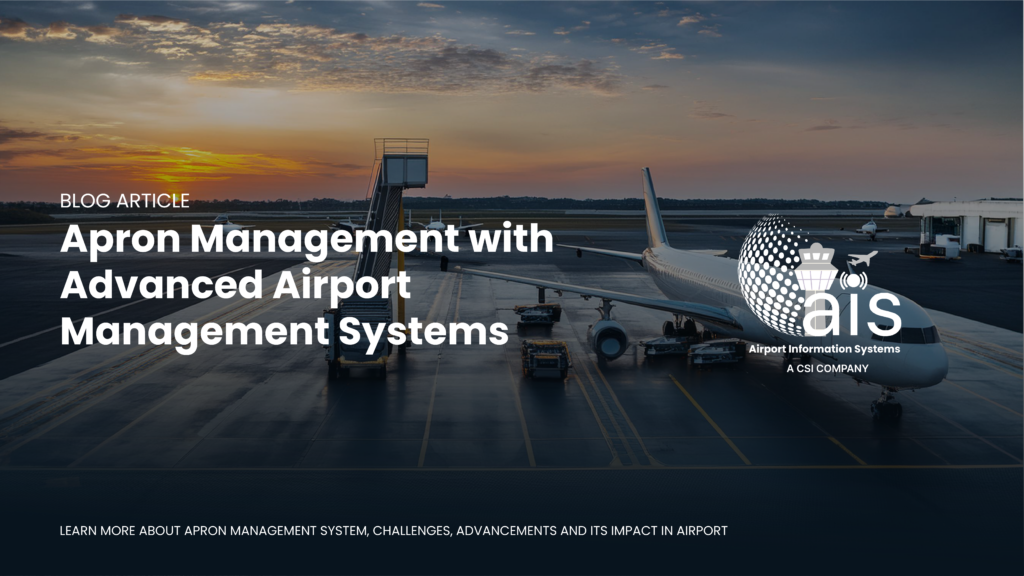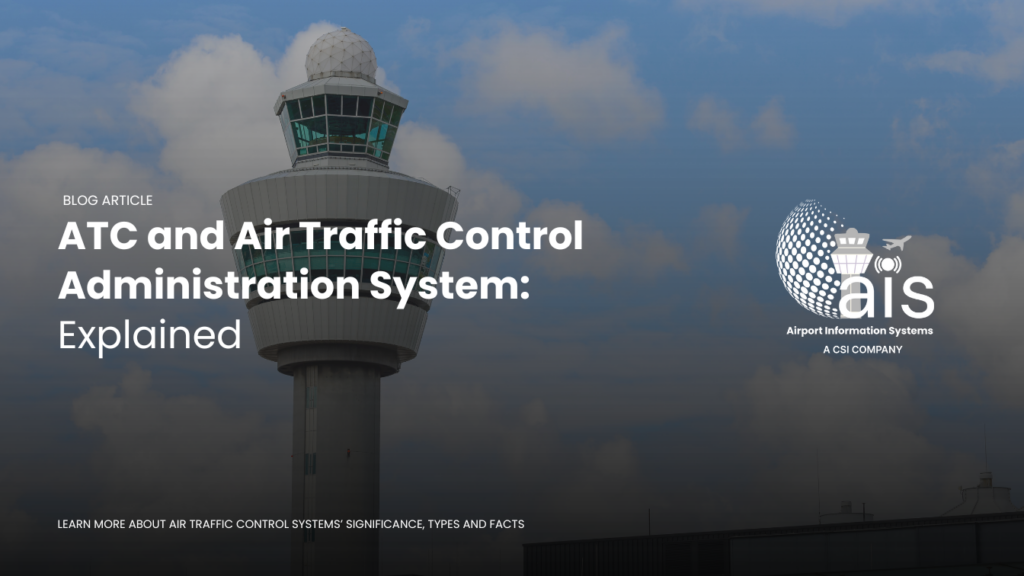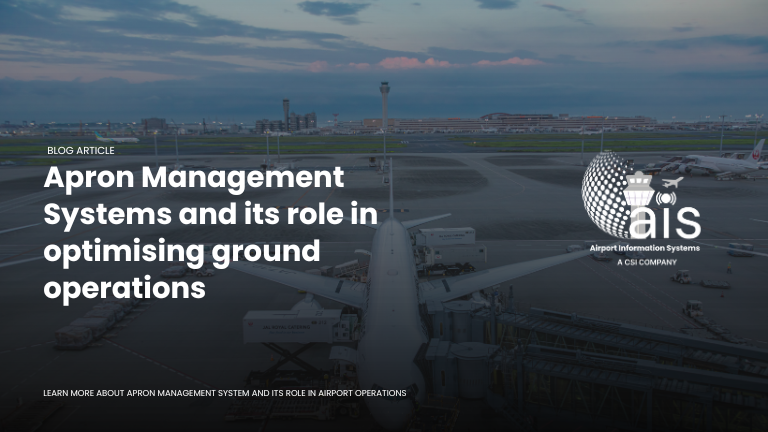Introduction
Airport aprons are essential for the smooth and efficient operation of aircraft. Understanding the critical role safety plays in these areas, airports around the world have stepped up their efforts with stringent safety measures and improved apron management practices. These proactive steps are key to reducing risks and keeping operations running safely and smoothly in this vital part of air travel.
To simply explain, the apron, where aircraft are parked, loaded, unloaded, refueled, and boarded, serves as the heartbeat of airport operations.
Ensuring seamless coordination and safety in this bustling area is paramount. As of 2024, advanced airport management systems are revolutionising apron management, addressing long-standing challenges, and setting new standards for efficiency, safety, and sustainability.
In this blog, let’s take a dive deeper into the world of Apron Management, learning about its challenges, modernisation, real-world implementation, and future trends.
Current Challenges in Apron Management
Managing apron operations involves balancing and navigating a maze of challenges that can impact the overall efficiency of an airport. Some of the most pressing issues include:
Congestion and Delays
One of the primary challenges in apron management is congestion. With multiple aircraft arriving and departing simultaneously, the apron can become overcrowded, leading to delays and logistical bottlenecks. This congestion affects not only the timely departure and arrival of flights but also the turnaround times, directly influencing airline schedules and passenger satisfaction.
Safety and Security Concerns
The apron is a high-risk area due to the constant movement of aircraft, ground support vehicles, and personnel. Ensuring safety and security in such a dynamic environment is a significant challenge. Accidents, whether minor collisions or severe incidents, can result in costly damages and operational disruptions. Moreover, maintaining security to prevent unauthorised access and potential threats is an ongoing concern.
Coordination and Communication Issues
Effective apron management requires seamless coordination and communication among various stakeholders, including ground handlers, air traffic controllers, airline staff, and maintenance crews. Miscommunication or lack of real-time information can lead to errors, delays, and inefficiencies, impacting the overall performance of airport operations.
Environmental Impact and Fuel Efficiency
Airports are increasingly focused on reducing their environmental footprint. The apron area, with its frequent aircraft movements and ground support activities, contributes significantly to emissions and fuel consumption. Improving fuel efficiency and minimizing environmental impact are critical goals for modern apron management.
Technological Advancements in Airport Management Systems
With the world of technology booming like never before, the aviation industry and airports are also leveraging their potential with airport management systems evolving to address these challenges more effectively.
Let’s look at some of the most innovative solutions that are transforming apron management:
Integration of AI and Machine Learning for Predictive Analytics
Artificial Intelligence (AI) and machine learning are at the forefront of modern airport management systems. These technologies enable predictive analytics, allowing airports to anticipate and mitigate potential issues before they escalate. For example, AI algorithms can analyse historical data and real-time inputs to predict congestion patterns, enabling proactive measures to optimize traffic flow on the apron.
Use of IoT for Real-Time Monitoring and Data Collection
The Internet of Things (IoT) has introduced a new level of connectivity and data collection in apron management. IoT devices, such as sensors and GPS trackers, are deployed across the apron to monitor various parameters, including aircraft movements, ground support vehicle locations, and environmental conditions. This real-time data provides a comprehensive view of apron operations, facilitating informed decision-making and efficient resource allocation.
Implementation of Advanced Communication Systems
Effective communication is the backbone of efficient apron management. Advanced communication systems, including high-speed wireless networks and integrated communication platforms, ensure that all stakeholders have access to real-time information. This seamless communication reduces the risk of miscoordination and enhances the overall efficiency of apron operations.
Impact of Modern Apron Systems on Apron Management
The implementation of advanced airport management systems in 2024 has brought about significant improvements in apron management. These systems are reshaping the way airports operate, yielding benefits in various areas:
Improved Scheduling and Resource Allocation
Apron management systems enable precise scheduling and resource allocation, minimising idle times and optimising the use of ground support equipment. By leveraging predictive analytics and real-time data, airports can efficiently allocate gates, parking positions, and ground handling services, reducing congestion and improving turnaround times.
Enhanced Safety and Security Measures
Safety is the top-most priority in apron management, and advanced systems play a crucial role in enhancing it. AI-powered surveillance systems monitor the apron area continuously, identifying potential hazards and triggering alerts for immediate action. Additionally, access control systems integrated with biometric authentication ensure that only authorised personnel can enter restricted areas, bolstering security measures.
Reduced Turnaround Times and Increased Efficiency
Efficiency is a key driver of apron management, and apron systems are instrumental in achieving it. Real-time monitoring and data-driven decision-making enable quick responses to any issues that arise, minimising delays and ensuring smooth aircraft movements. This reduction in turnaround times translates to cost savings for airlines and improved punctuality for passengers.
Environmental Benefits Through Optimised Fuel Usage and Reduced Emissions
Sustainability is a growing focus in aviation, and advanced systems like the apron management, contribute significantly to environmental goals.
By optimising aircraft movements and ground support activities, these systems reduce unnecessary idling and fuel consumption. Furthermore, predictive maintenance powered by AI ensures that ground support vehicles and equipment operate efficiently, minimising emissions and environmental impact.
AFIDS – The Apron Management Software
AIS’ AFIDS (Airport Flight Information Display System) is a real-time apron management system that exemplifies modern advancements in the field. It allows airlines or handling agents to enter key information in IATA format, managing details such as stand allocation, ground services, and de-icing fluid entry. AFIDS also interfaces with a specialised stand allocation system, optimising resource usage and reducing delays.
AFIDS enhances safety by providing Air Traffic Control with assigned stand information, reducing miscommunication risks. Additionally, it generates valuable statistical data on bag handling times, enabling efficient planning of apron equipment and manpower. This streamlined process minimises turnaround times, making AFIDS a crucial tool for optimizing apron management operations.
Future Trends and Developments in Airport Apron Management
The future of apron management is poised for further advancements, driven by emerging technologies and innovative solutions.
The aviation industry is exploring various technologies, including autonomous ground support vehicles, blockchain for secure data sharing, and advanced robotics for baggage handling, which have the potential to revolutionise apron management by enhancing efficiency, safety, and sustainability. Looking ahead, airport management systems will continue to evolve, incorporating more sophisticated AI algorithms, expanding IoT networks, and integrating augmented reality for enhanced situational awareness, ultimately creating a seamless, interconnected ecosystem that optimises every aspect of apron management.
To stay ahead of the curve, airports must invest in research and development, collaborate with technology providers, and foster a culture of innovation, ensuring they are well-prepared to meet the challenges and opportunities of the future.
Conclusion
Advanced airport management systems, like AFIDS, are transforming apron management in aviation, addressing long-standing challenges and setting new benchmarks for efficiency, safety, and sustainability. As we move forward, the integration of AI, IoT, and advanced communication systems will continue to drive improvements, creating a more streamlined and resilient aviation industry.
For aviation industry stakeholders, now is the time to explore and invest in advanced systems, particularly Apron management, that can significantly impact airport operations and management. By leveraging these cutting-edge technologies, airports can enhance their operations, improve passenger experiences, and contribute to a more sustainable future.
AIS’s AFIDS is a standout choice for apron management software, offering advanced features like real-time data entry in IATA format, integration with stand allocation systems, and comprehensive safety enhancements. By streamlining operations and providing valuable statistical insights, AFIDS ensures optimal resource usage and minimizes turnaround times.
Discover how AFIDS can revolutionize your airport operations by contacting AIS today for a demonstration.


